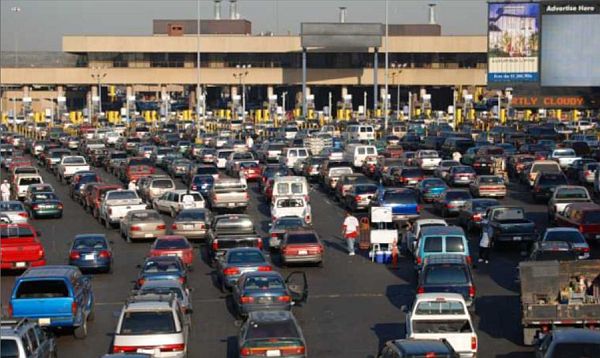Washington D.C. - In an effort to raise more money for border protection and inspection, the US Department of Homeland Security wants Congress to authorize the study of a fee that could be collected at all land crossings with Mexico and Canada.
The litigious issue was buried deep within the department’s proposed 2014 budget, released last week by DHS Secretary Janet Napolitano. It might have slipped by unnoticed if US Representative Brian Higgins, hadn’t sounded the alarm late last Friday.
Higgins, who's a member of the House Committees on Homeland Security and Foreign Affairs and also serves on the US-Canada Inter-Parliamentary Group, said he would "fight to put the breaks on this shortsighted fee."
"At a time when we are looking to increase economic activity at our borders, we should not be authoring proposals that would do the reverse. Putting up barriers to hinder trade and tourism is the absolute last thing we should be doing if we want to stimulate the economy in the United States," he said.
Higgins also suggested that most of the money collected along the United States-Canadian border would most surely be used to finance the more challenging and expensive border with Mexico.
According to Section 544 of the budget proposal, the Commissioner of the US Customs and Border Protection should "conduct a study assessing the feasibility and cost relating to establishing and collecting a land border crossing fee for both pedestrians and passenger vehicles along the northern and southwest borders of the United States."
Currently, air and sea passengers pay to enter the US. Each time this type of traveller enters the country, they pay a $5.50 "customs fee," which is often hidden into the cost of the ticket - but travelers aren't charged for crossing the border by car, bus, or train. Border crossings in some cities, such as Buffalo and Detroit, occur on toll bridges, but the money collected goes to the bridge authorities - not the DHS - and, under the proposal, the Commissioner would look at the feasibility of collecting fees from these existing operators as well.
 |
Given the early stages of the proposal, just how such a fee might work – whether it might apply to travellers leaving the US as well and what it might cost – is far from clear. The study will explore any legal and regulatory obstructions to establishing and collecting the fees, and it would be complete within nine months of the enactment of the budget proposal.
About 300,000 people cross between the US and Canada every day - most of which are for shopping purposes. Eager to protect this vital trade, politicians from the northern United States have so far successfully blocked all previous proposals to generate more income along the northern border.
The Canada-US economic relationship is one of the largest in the entire world. Trade in goods and services between the two countries totaled around $645 billion in 2010, or more than $1.7 billion a day. Transport of many commercial goods and agricultural products already involves border crossing fees and additional fees are unlikely to help the new bilateral "Beyond the Border" plan to ease traffic and promote trade.
"It’s important to note that this is simply a study at this point," Chris Plunkett, a spokesman at the Canadian Embassy in Washington, said. "We’re confident that any study would conclude that the economic damage done by any such fee would outweigh any revenue generated."
In a statement, Secretary Napolitano said Homeland Security needed to find new sources of revenue in order to hire more guards and support the increasingly expensive operations at the borders.
"Foreigners provide nearly $150 billion in economic stimulus annually - Canadians spend around $21-billion every year. And yet, the fees that support the operations to process the more than 350 million travelers each year, haven't been adjusted in some cases for more than a decade. As the complexity of our operations continues to expand, the gap between fee collections and the operations they support is growing, and the number of workforce hours fees support decreases each year," Napolitano said.
Source: International Business Times


